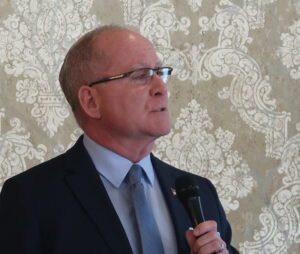Who is a member?
Our members are the local governments of Massachusetts and their elected and appointed leadership.

Shrewsbury Police Chief Kevin Anderson discusses body-worn camera negotiation and implementation during a joint meeting of the Massachusetts Municipal Management Association and Massachusetts Municipal Human Resources on March 21.
Civil service legislation and police body-worn cameras were the primary topics of the annual joint meeting of the Massachusetts Municipal Management Association and Massachusetts Municipal Human Resources on March 21 in Wrentham.
MMA Legislative Director Dave Koffman and Danvers Assistant Town Manager Jen Breaker, a member of the Special Legislative Commission to Study and Examine the Civil Service Law, provided an update on the status of civil service legislation on Beacon Hill.
Breaker summarized the proposal from the special commission: an opt-in, hybrid pathway that would expand the pool of entry-level police and fire candidates in municipalities by allowing applicants who may not have taken traditional Civil Service examinations. Additional recommendations include establishing a department within the Human Resources Division to implement recruitment strategies and provide hiring support, and increasing the frequency of entry-level police and fire examinations to three times a year.
“This proposal is really seen as a compromise,” Koffman said. “There’s a lot of traction on this in both chambers.”
He said the proposal is now up for consideration by the House Committee on Ways and Means.
Body-worn cameras
Police body-worn camera negotiation and implementation was the subject of a panel discussion featuring attorneys Nicholas Anastasopoulos and John Davis and the police chiefs from Dennis and Shrewsbury, John Brady and Kevin Anderson, respectively.
Anastasopoulos reviewed trends in body-camera negotiation, including court decisions on bargaining obligations over unilateral changes to existing conditions of employment, and the installation of GPS to monitor employee performance.
The police chiefs shared their experiences implementing body-worn camera pilot programs in their departments.
“We learned that the pros far outweigh the cons,” Anderson said.
In addition to supporting officer accountability, transparency and safety, the Shrewsbury Police Department found that footage from body-worn cameras provide a helpful new source of training material.
Brady discussed how the Dennis pilot program was rolled out in eight phases, including the formation of a committee to review the future of the program, as well as its software and equipment.
“In three years, the tech will change again,” Brady said, “so we’ll need more discussion.”
Davis summarized the legal liabilities associated with body-worn camera programs, reviewing takeaways from prominent case examples that “wrestled with the tech.”
The panel concluded with a Q&A moderated by Carlton Town Administrator Andrew Golas.
MMA Executive Director Adam Chapdelaine gave a legislative update to open the MMMA/MMHR meeting.